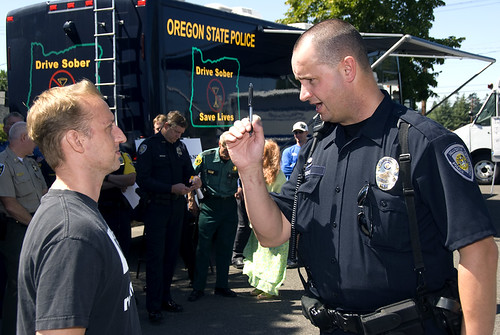DWI Enforcement: Getting both tough and sensible
Posted on by Townsend Myers Recent events in the news highlight two sides of the debate over drunk driving. The dark side – repeat offenders often fall through the system and keep driving; and the light side – first offenders, given the opportunity to change through monitoring and education, often learn their lesson and don’t offend again.
Recent events in the news highlight two sides of the debate over drunk driving. The dark side – repeat offenders often fall through the system and keep driving; and the light side – first offenders, given the opportunity to change through monitoring and education, often learn their lesson and don’t offend again.
Out of the studio of WDSU comes the story of George Semmes, a man who has arrested been 10 times in Orleans Parish for driving drunk, but has not stood trial a single time on any of those charges. In fact, he’s still driving around, putting the rest of us in danger every day. Read story
All of us make mistakes — it may be one of the few things we all have in common. Another thing we all have in common is the growing misuse of the word “mistake,” as in, “Why can’t people just get over Michael Vick — he just made a mistake.” Writing the wrong date on your checks is a mistake; if you do something consistently for over five years, then that’s who you are.
Louisiana’s Commissioner of Administration Paul Rainwater made a mistake. He was arrested on a first-offense DWI. No one was injured (though certainly someone could have been), and there was no evidence of any pattern of abuse or other red flag. In light of that, the Commissioner will not stand trial on his first-offense DWI, but instead will enter a pre-trial program for DWI offenders that seeks to rehabilitate, rather than demonize, those who have made this mistake. Read story
“We’re not treating him different than we would treat any other offender,” says Baton Rouge City Court Prosecutor Lisa Freeman, “Rainwater will have to breathe into an interlock device to start his car, pick up litter and undergo alcohol screenings as part of the program.” Freeman continued, “He’s a first-time offender, which is why he’s eligible.”
This is not a special circumstance or a free ride. Over the course of a year, participants in this program must fulfill a number of requirements that include:
- Installing an interlock device for six months.
- Undergoing a substance-abuse evaluation with possible treatment being ordered.
- Attending classes on alcohol abuse as well as a class conducted by Mothers Against Drunk Driving.
- Completing driver improvement school.
- Performing 32 hours of community service, half of which is litter detail.
- Drug and alcohol screenings.
If Rainwater, like all program participants, successfully completes this program, then he will not have a drunken driving conviction on his record, and the DWI arrest will be removed after five years without incident. Compare Rainwater’s situation with George Semmes, the ten-time offender. Rainwater made a mistake. Semmes? Sounds like a way of living.
The point I want to make is that while DWI enforcement is important, diversion programs for first-offenders are a great way for offenders to learn from their mistakes. We shouldn’t be too quick to throw everyone under the umbrella of prosecution and punishment. Diversion programs can provide the necessary wake-up call for DWI offenders who likely will not repeat offend if given the appropriate sanctions and education.
We need a first time offender’s diversion program for DWIs like this in New Orleans. There have been whispers about it or years, but nothing formally done about it. If enacted, it could likely be as effective as other alternative sentencing programs currently in place in here, dramatically reducing the cost and efficiency of DWI prosecutions, while maintaining public order and safety by educating first offenders to help prevent future behavior rather than just punish past mistakes.











